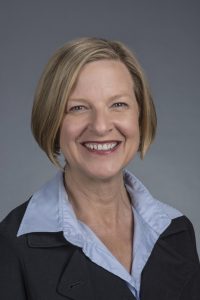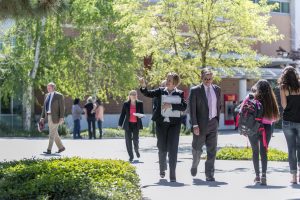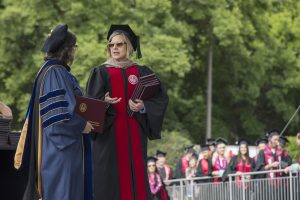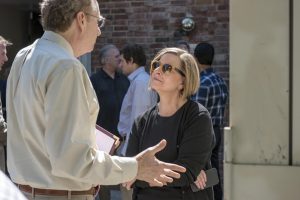by Gabriel Sandoval
Lorraine Hoffman, Chico State’s former vice president for business and finance, hasn’t worked on campus since June 2016.

Lorraine B. Hoffman in 2014
But for the last 16 months, she’s remained on Chico State’s payroll – first while on vacation, then on administrative leave and finally as a “special assistant” for California State University’s Office of the Chancellor in Long Beach – collecting employee benefits and grossing $324,256. The total compensation Hoffman received from Chico State for the 16-month period exceeded $418,000, including about $5,500 a month in retirement system payouts.
“They do this for the people that are making six figures, but they don’t do that for custodians,” said Pat Gantt, state president of the CSU Employees Union and a 36-year employee of Chico State. “You know, they don’t do that for the people that I represent.”
Tim Sistrunk, a history professor and president of Chico State’s chapter of the California Faculty Association, described the Hoffman arrangement as representative of systemic problems within the CSU, which were illuminated by a state audit in April that found certain campuses could not justify the growth of upper management positions or the rising rate of compensation for them.
“Their own pay is all out of portion to the value that the state gets,” said Sistrunk, speaking broadly about CSU management.
A CSU spokesperson, Michael Uhlenkamp, confirmed that Hoffman retired in September.
Chico State records show that she was last paid in October: $20,266, a lump sum vacation payout. Hoffman could not be reached for comment before ChicoSol’s deadline.
The former campus leader had spent eight years as Chico State’s chief financial officer, providing “sound fiscal management and consistent advocacy for the campus workforce,” according to a university announcement upon her departure. She was also one of three administrators identified in the Academic Senate’s 2015 resolution of no confidence, which declared the senate lost confidence in the ability of Hoffman, then-Interim Provost Susan Elrod and then-President Paul Zingg to effectively manage personnel and budget matters.
In 2014, multiple employees accused Hoffman of workplace bullying, allegations she denied.

Lori Hoffman (left) walks with CSU General Counsel Chris Fowler during Fowler’s 2015 campus visit.
The arcane work arrangement was first revealed in January, when an article in The Orion, Chico State’s student newspaper, detailed an agreement between Hoffman and the CSU Board of Trustees that secured “her employment within the public university system until Sept. 30, 2017, when ‘she will voluntarily retire or resign,’ according to a copy of the agreement.”
“Chico State now desires to transition Hoffman to other duties,” reads the memorandum of understanding between Hoffman and the trustees, which was obtained through a California Public Records Act request, along with other records including a resignation letter post-dated Sept. 30, 2017, written by Hoffman and addressed to Gayle Hutchinson, Chico State’s president.
The memo was signed by CSU Chancellor Timothy White, with no date beside his signature, and by Hoffman, a smiley face beside hers, on July 1, 2016, the day after she left campus.
“The Parties wish to avoid any disputes related to Hoffman’s transition and to avoid the expense, inconvenience and uncertainty of future proceedings,” continues the five-page document.
Uhlenkamp told The Orion the CSU didn’t want to face a lawsuit from Hoffman. According to the agreement, she gave up her ability to file complaints against the system.
While at Chico State, Hoffman was an at-will employee, meaning the university could have fired her at any time, for any reason, except those protected by state or federal labor laws, such as discrimination, retaliation or refusal to commit an illegal act.
Sistrunk theorized since Hoffman was a campus executive, privy to confidential information about the CSU’s internal operations, her compensation was a form of “hush money,” a deterrent against her pursuing litigation and exposing clandestine practices.
“This is something I can’t prove,” he explained, speculating that the cost of paying Hoffman must have been less than the CSU’s anticipated cost of defending itself in court against her.
Gantt wasn’t surprised by Hoffman’s agreement. He said through the years he’s heard of other administrators allegedly being given “golden handshakes” or “soft landings,” terms used to describe generous severance packages for executives. He said the practice is not widely known, but, as far as he can tell, it is not illegal.
Uhlenkamp said he isn’t aware of each individual hire at the CSU and could not speak to the frequency of its hiring of former vice presidents or campus leaders. “Unfortunately, there’s no way for me to begin to provide an estimate of how often that happens,” he said.

Susan Elrod (left) and Lori Hoffman (right) present diplomas to graduates during the commencement ceremony for the colleges of Humanities and Fine Arts and Business at University Stadium on May 17, 2015.
Vacation, Leave, Assist, Retire
After her departure from Chico State, Hoffman began three months of paid vacation, followed by four months of paid administrative leave. On Feb. 1, her title changed to special assistant to the CSU’s executive vice chancellor and chief financial officer. She reported to Brad Wells, associate vice chancellor for business and finance. According to the agreement, she would assist on the CSU’s “finance and/or capital planning” projects and could work remotely.
The agreement also stipulated: “Costs associated with pay and benefits during the entire period Oct. 1, 2016 through Sept. 30, 2017, shall be the responsibility of Chico State.”
Her compensation came from Chico State’s general operating fund, the majority of which comes from taxpayer dollars and students’ tuition and fees, according the university’s government transparency website. The fund mostly covers employee salaries, wages and benefits.
In August, ChicoSol submitted a public records request to the CSU for evidence of Hoffman’s work products, hoping to learn precisely what she worked on and if Chico State benefited somehow. The request sought Hoffman’s daily schedule, all her written correspondence with the CSU’s finance department, and any reports, presentations, evaluations or analyses that she produced.
Weeks later, Uhlenkamp emailed to explain that Hoffman helped evaluate “processes used to review and approve public-private partnership projects” for the CSU’s 23 campuses, and interviewed campus chief financial officers about assistance from the chancellor’s office for such projects.
He also noted that Hoffman was assigned to assist CSU, Dominguez Hills, to develop a public-private partnership project for conceptual approval at the trustees’ September meeting.
For that assignment, he said, she participated in meetings with consultants on campus; helped assemble a request for proposal, documents and plans related to the proposed development; and aided in the review and analysis of “market and demand studies associated with the plan.”
In that same email, Uhlenkamp said the CSU denied much of ChicoSol’s request, citing multiple exemptions in the public records act, including one that bars the disclosure of “drafts, notes, or interagency or intra-agency memoranda … if the public interest in withholding those records clearly outweighs the public interest in disclosure.”
Certain communications were protected by attorney-client privilege. Others were withheld because of a “deliberative process exemption,” known by open-government proponents as a catchall exemption that state agencies cite liberally.
“The California Supreme Court has acknowledged the need to enable officials to have candid discussions and healthy debate prior to making decisions,” Uhlenkamp wrote, citing a 1991 case, Times Mirror Co. v. Superior Court, in which the court determined Gov. George Deukmejian’s schedules were not subject to disclosure because a threat to his personal safety could arise if released, fueling the court’s judgment that confidentiality outweighed disclosure in that case.
“The communications shared between Ms. Hoffman and campus officials were all conducted with the specific purpose of developing University policy,” Uhlenkamp wrote. “Accordingly, the communications are exempt and will not be produced.”
Ultimately, the CSU produced 64 pages of Hoffman’s emails, some of which were duplicates. Nevertheless, they offer a glimpse into her work. A few emails were redacted and most were exchanged between Hoffman and her temporary boss, Wells.

‘Getting to Work’
On Feb. 7, records show, Hoffman emailed Wells. The subject line was “getting to work,” and she wanted to know when he was available to speak. It was her seventh day on the job.
“Perhaps we could schedule a quick call in the next few days,” Hoffman wrote. Wells responded the next day.
“Are you available tomorrow at some point to talk?” he asked.
The following day came without a response from Hoffman, so he emailed her again.
“I wanted to be sure you received my e-mail below,” he wrote, an apparent reference to his previously unanswered email. “I’m around all day if you have time to talk…”
Hours later, on that afternoon of Feb. 10, Hoffman explained that she didn’t receive his message because she was “still working out the ‘bugs’ on the new email server.”
“Sorry I missed you today,” she wrote. She then suggested they speak on the phone in the week ahead.
On the morning of Feb. 13, nearly two weeks after transitioning into the role, Hoffman received an email from Wells. It gave her two windows of time when he was available to speak.
“Great,” Hoffman replied. “4pm works best for me today. I’ll call you.”
That day, it appears, Hoffman finally got to work.
In subsequent emails over the following months, Hoffman appeared to be working on the CSU’s finance projects, under the direction of Wells. Many emails have day- or week-long gaps between them, raising questions about the amount of work she actually performed.
Wells could not be reached for comment.
According to Transparent California, a website that posts the income of state workers, Hoffman collected the second-highest pay of employees who mostly worked on the Chico State campus in 2016, with $244,534. The highest paid was Paul Zingg, the previous president, with $368,441.
Once Hoffman left campus, she was replaced on an interim basis by James Hyatt. He was succeeded on a permanent basis in May by Robbi Stivers.
If you have experience with or information about CSU severance arrangements, including ones from years ago, please email: gabriellsandoval@gmail.com.
Gabriel Sandoval is a senior journalism major at Chico State and a ChicoSol intern.

Holy Sh**. This is disgusting. I am FUMING right now, thinking of the hard-working lecturers with MAs and PhDs making $1000 a semester to teach a class, while this person makes that same amount in an hour while she fiddles with her e-mail. Thank you, Gabriel, for an excellent job of reporting.
Inspired by Gabriel Sandoval’s article in ChicoSol I did some additional research. I wanted to see exactly who these “Trustees” were, so went to their website: https://www2.calstate.edu/csu-system/board-of-trustees/meet-the-board-of-trustees
Then ran across this interesting article: https://csulauniversitytimes.com/9441/news/lets-talk-about-money/
It was very interesting to see where they are coming from. Also looked at their public salaried income.
https://transparentcalifornia.com/salaries/2016/
Looks like many are perhaps laying a game plan for their own grand exit. Was interesting to see that the Student Voting Rep. Jorge Reyes Salinas did not vote on this, probably because it would have been a conflict of interest??? Lots to speculate on all this. Might be interesting to talk to some of these folks.
Richard, thanks for providing those links.
This is why I support Delaine Eastin as our next and 1st woman Governor of CA. As former Superintendant of Public Insturction for the state, Delaine would fix this!
She really would! Her time was one of great education in CA.
This is a terrific piece of investigative journalism by a talented reporter. Keep up the great work, Gabriel!